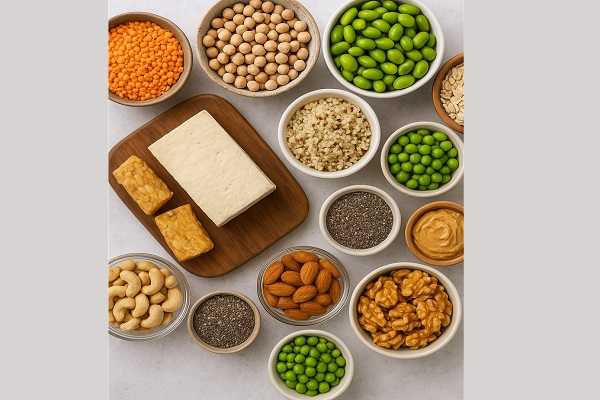
Follow us Now on Telegram ! Get daily 10 - 12 Interesting Updates. Join our Telegram Channel https://t.me/OhWomen
Download Telegram App before Joining the Channel
As more people shift toward healthier and more sustainable lifestyles, plant-based proteins are gaining remarkable attention. For years, meat has been considered the king of protein, but today, many plant-based alternatives not only match but outperform meat in nutrition, digestibility, and overall health benefits.
Plant-based proteins aren’t just for vegans and vegetarians—they’re for anyone who wants cleaner, lighter, and more nutrient-rich options without compromising on strength or energy.
Why Plant-Based Protein Matters
Unlike meat, plant proteins come with added benefits:
Rich in fiber
Zero cholesterol
Packed with vitamins, minerals, and antioxidants
Easier to digest
Environment-friendly
With the right mix, plant-based proteins can fully meet daily protein needs while improving gut health, boosting immunity, and keeping energy levels steady.
Top Plant-Based Protein Sources That Beat Meat
1. Lentils – The Underrated Powerhouse
Lentils offer around 18 grams of protein per cooked cup, plus fiber that keeps digestion smooth.
They also contain iron, folate, and essential minerals, making them a complete meal in themselves.
2. Chickpeas – Protein + Crunch + Versatility
Boiled chickpeas have 15 grams of protein per cup, and they can be used in salads, hummus, curries, or roasted snacks.
They help stabilize blood sugar and keep you full longer.
3. Quinoa – A Complete Protein Grain
Unlike most grains, quinoa contains all nine essential amino acids.
With 8 grams of protein per cup, it competes directly with lean meat.
It’s also gluten-free and easy to digest.
4. Tofu & Tempeh – Plant Proteins Loved Worldwide
Both tofu and tempeh come from soybeans, which are naturally rich in protein.
Tofu: 10–12 grams per 100g
Tempeh: 18–20 grams per 100g
They also contain healthy fats, calcium, and antioxidants—great for muscle building.
5. Edamame – Green Protein Pods
Steamed edamame offers 17 grams of protein per cup, along with fiber, vitamins, and omega-3 fatty acids.
They’re great as snacks, in salads, or added to stir-fry dishes.
6. Nuts & Nut Butters – Small but Mighty
Almonds, peanuts, walnuts, and cashews offer between 5–7 grams of protein per serving.
They also provide healthy fats that support brain and heart health.
Nut butters like peanut butter or almond butter are perfect for smoothies or toast.
7. Chia Seeds & Hemp Seeds – Tiny Power Nuggets
Chia seeds: 4.7 grams per 2 tablespoons
Hemp seeds: 10 grams per 3 tablespoons
These seeds are loaded with omega-3s, fiber, and essential amino acids.
Sprinkle them on oats, salads, or smoothies for a nutrient boost.
8. Green Peas – Surprising but Strong
A cup of green peas contains 9 grams of protein, making it one of the easiest and most affordable plant proteins.
Pea protein is now widely used in shakes and plant-based meat alternatives.
Do Plant Proteins Build Muscle?
Absolutely.
When combined properly, plant-based proteins provide all essential amino acids needed for muscle repair and growth.
Athletes worldwide now depend on plant proteins for lean gains, better digestion, and improved performance.
Health Benefits of Choosing Plant-Based Protein
* Supports weight management
* Improves heart health
* Reduces inflammation
* Enhances gut health
* Lowers the risk of lifestyle diseases
*Boosts long-term immunity
How to Add More Plant Protein to Your Diet
Replace one meat meal with pulses or legumes
Add tofu or tempeh to stir-fries
Use quinoa instead of rice
Snack on nuts and roasted chickpeas
Add seeds to your smoothies and salads
Try plant-protein shakes made from peas or hemp
Small changes can lead to huge health benefits over time.
Plant-based proteins are no longer just an alternative—they’re a nutrition-packed upgrade. They fuel the body, protect health, and support the planet. With variety, nutrients, and versatility, these power foods prove that you don’t need meat to meet your protein goals.